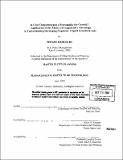Is cost competitiveness a prerequisite for growth? : application of the theory of comparative advantage in understanding developing countries' export growth in Asia
Author(s)
Tsubouchi, Minami
DownloadFull printable version (6.476Mb)
Other Contributors
Massachusetts Institute of Technology. Dept. of Urban Studies and Planning.
Advisor
Alice H. Amsden.
Terms of use
Metadata
Show full item recordAbstract
The theory of comparative advantage argues that countries benefit from trade even without cost competitiveness and that what matters is the difference between efficiencies at which a country can produce different goods and services within its economy. In reality, however, a significant proportion of trade seems to occur based on cost competitiveness. China's exports to Japan have skyrocketed in the last decade, but the growth is mainly in labor-intensive industries because of the competitive prices that China can offer in global markets. This study intends to review the limitations of applying the theory of comparative advantage to interpreting the recent economic growth in Asia through theoretical reviews and a case study on Japan and China. The analysis reveals that comparative advantage can drive a developing country without cost competitiveness to growth of exports on the condition that a hierarchical mechanism exists in which an advanced country creates demand for further specialization through industrial upgrading and hands over its declining industries to the developing country. When the advanced country's need for further specialization is not sufficient, the developing country would be compelled into cost competition with the advanced country. (cont.) In other words, cost competitiveness is a prerequisite for a developing country to grow in bilateral trade when the advanced country's industrial upgrading decelerates. Developing countries' only source of cost competitiveness is their abundant labor, and labor can only help the country flourish in the labor-intensive, low-value-added industries. Hence, in pursuit of developing countries' further growth in higher-value-added industries, it is crucial to formulate policies to create a hierarchical mechanism in which a developing country takes over industries from an advanced country in such a way that the two countries' comparative advantages would be most effectively leveraged.
Description
Thesis (M.C.P.)--Massachusetts Institute of Technology, Dept. of Urban Studies and Planning, 2006. Includes bibliographical references (leaves 66-70).
Date issued
2006Department
Massachusetts Institute of Technology. Department of Urban Studies and PlanningPublisher
Massachusetts Institute of Technology
Keywords
Urban Studies and Planning.